Grand Canyon University: NRS-433 Hand Hygiene Research Report
VerifiedAdded on 2022/08/24
|7
|1559
|16
Report
AI Summary
This report, prepared for a Nursing Research course, critically analyzes two quantitative studies comparing the effectiveness of alcohol-based sanitizers versus soap and water in controlling nosocomial infections. The research investigates the problem, significance to nursing, purpose, objective, and research questions. It examines the methods used, including observation, cohort studies, and statistical analysis, highlighting their benefits and limitations. The study results indicate that alcohol-based sanitizers are more effective in reducing infections compared to soap and water, particularly due to the increasing resistance of germs to soap. The report discusses the implications of these findings for nursing practice, emphasizing the importance of hand hygiene and the adoption of alcohol-based sanitizers. The anticipated outcomes and the actual outcomes of the chosen articles are then compared, further supporting the preference for alcohol-based hand sanitizers in hospitals to maintain hygiene and reduce cross-infections.
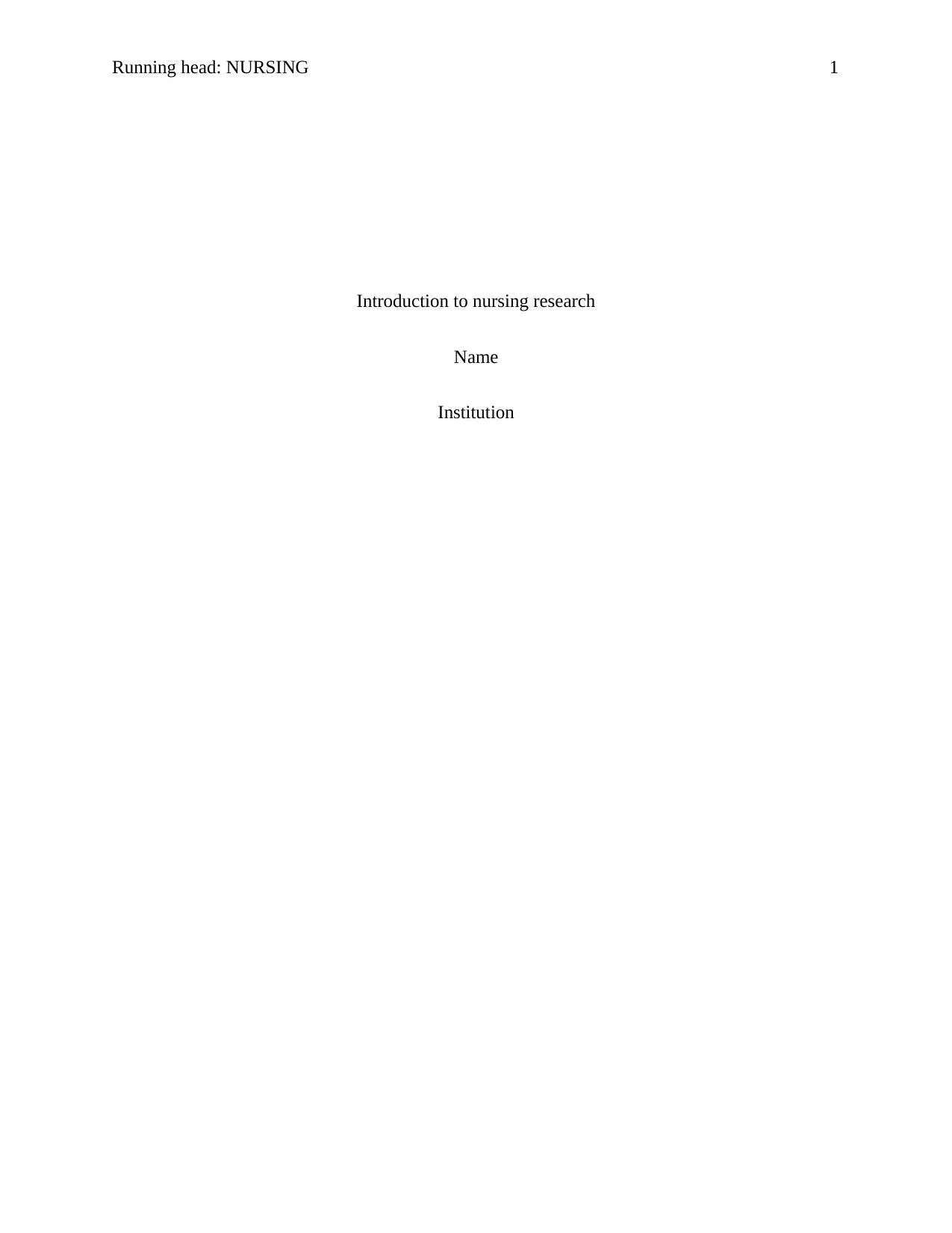
Running head: NURSING 1
Introduction to nursing research
Name
Institution
Introduction to nursing research
Name
Institution
Paraphrase This Document
Need a fresh take? Get an instant paraphrase of this document with our AI Paraphraser
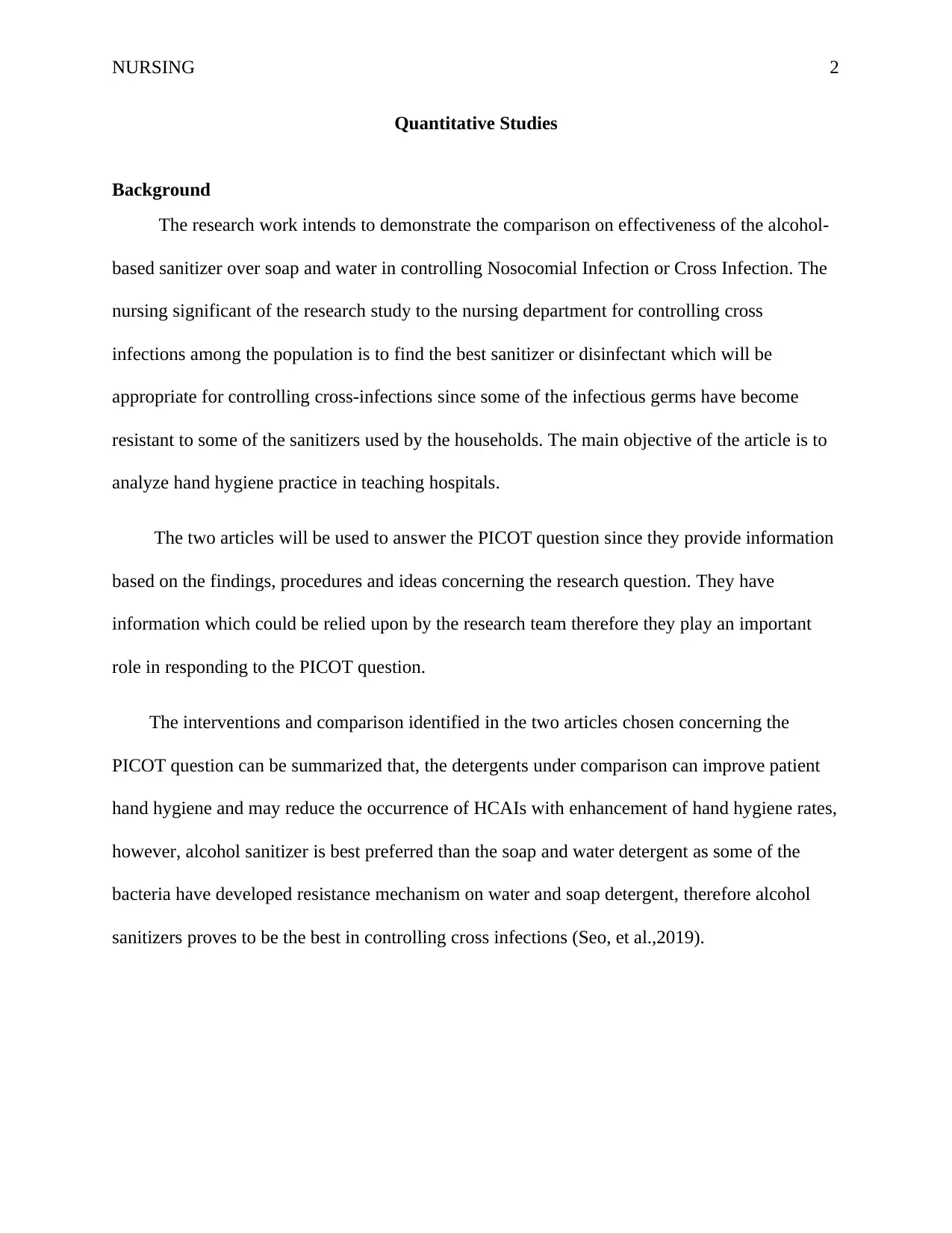
NURSING 2
Quantitative Studies
Background
The research work intends to demonstrate the comparison on effectiveness of the alcohol-
based sanitizer over soap and water in controlling Nosocomial Infection or Cross Infection. The
nursing significant of the research study to the nursing department for controlling cross
infections among the population is to find the best sanitizer or disinfectant which will be
appropriate for controlling cross-infections since some of the infectious germs have become
resistant to some of the sanitizers used by the households. The main objective of the article is to
analyze hand hygiene practice in teaching hospitals.
The two articles will be used to answer the PICOT question since they provide information
based on the findings, procedures and ideas concerning the research question. They have
information which could be relied upon by the research team therefore they play an important
role in responding to the PICOT question.
The interventions and comparison identified in the two articles chosen concerning the
PICOT question can be summarized that, the detergents under comparison can improve patient
hand hygiene and may reduce the occurrence of HCAIs with enhancement of hand hygiene rates,
however, alcohol sanitizer is best preferred than the soap and water detergent as some of the
bacteria have developed resistance mechanism on water and soap detergent, therefore alcohol
sanitizers proves to be the best in controlling cross infections (Seo, et al.,2019).
Quantitative Studies
Background
The research work intends to demonstrate the comparison on effectiveness of the alcohol-
based sanitizer over soap and water in controlling Nosocomial Infection or Cross Infection. The
nursing significant of the research study to the nursing department for controlling cross
infections among the population is to find the best sanitizer or disinfectant which will be
appropriate for controlling cross-infections since some of the infectious germs have become
resistant to some of the sanitizers used by the households. The main objective of the article is to
analyze hand hygiene practice in teaching hospitals.
The two articles will be used to answer the PICOT question since they provide information
based on the findings, procedures and ideas concerning the research question. They have
information which could be relied upon by the research team therefore they play an important
role in responding to the PICOT question.
The interventions and comparison identified in the two articles chosen concerning the
PICOT question can be summarized that, the detergents under comparison can improve patient
hand hygiene and may reduce the occurrence of HCAIs with enhancement of hand hygiene rates,
however, alcohol sanitizer is best preferred than the soap and water detergent as some of the
bacteria have developed resistance mechanism on water and soap detergent, therefore alcohol
sanitizers proves to be the best in controlling cross infections (Seo, et al.,2019).
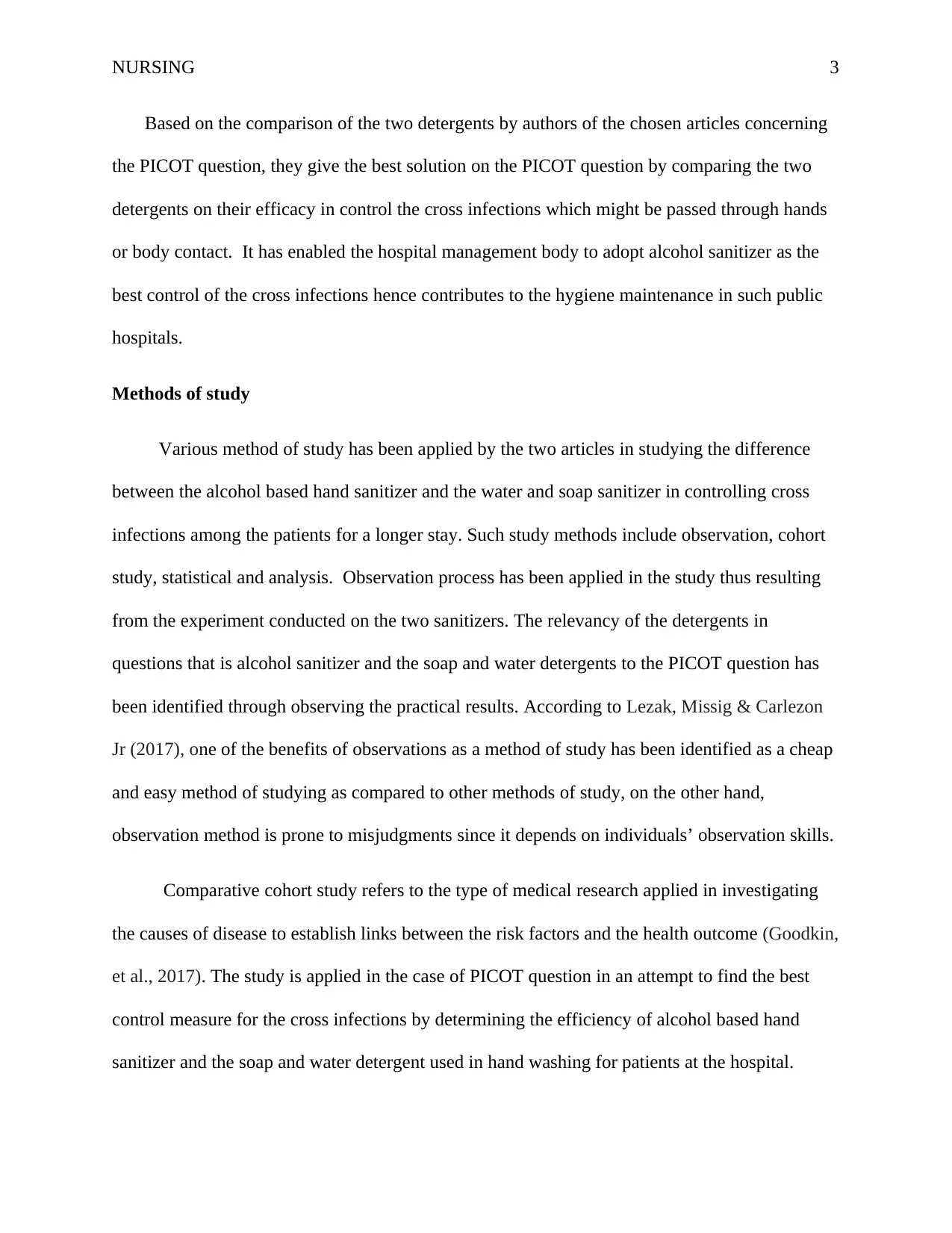
NURSING 3
Based on the comparison of the two detergents by authors of the chosen articles concerning
the PICOT question, they give the best solution on the PICOT question by comparing the two
detergents on their efficacy in control the cross infections which might be passed through hands
or body contact. It has enabled the hospital management body to adopt alcohol sanitizer as the
best control of the cross infections hence contributes to the hygiene maintenance in such public
hospitals.
Methods of study
Various method of study has been applied by the two articles in studying the difference
between the alcohol based hand sanitizer and the water and soap sanitizer in controlling cross
infections among the patients for a longer stay. Such study methods include observation, cohort
study, statistical and analysis. Observation process has been applied in the study thus resulting
from the experiment conducted on the two sanitizers. The relevancy of the detergents in
questions that is alcohol sanitizer and the soap and water detergents to the PICOT question has
been identified through observing the practical results. According to Lezak, Missig & Carlezon
Jr (2017), one of the benefits of observations as a method of study has been identified as a cheap
and easy method of studying as compared to other methods of study, on the other hand,
observation method is prone to misjudgments since it depends on individuals’ observation skills.
Comparative cohort study refers to the type of medical research applied in investigating
the causes of disease to establish links between the risk factors and the health outcome (Goodkin,
et al., 2017). The study is applied in the case of PICOT question in an attempt to find the best
control measure for the cross infections by determining the efficiency of alcohol based hand
sanitizer and the soap and water detergent used in hand washing for patients at the hospital.
Based on the comparison of the two detergents by authors of the chosen articles concerning
the PICOT question, they give the best solution on the PICOT question by comparing the two
detergents on their efficacy in control the cross infections which might be passed through hands
or body contact. It has enabled the hospital management body to adopt alcohol sanitizer as the
best control of the cross infections hence contributes to the hygiene maintenance in such public
hospitals.
Methods of study
Various method of study has been applied by the two articles in studying the difference
between the alcohol based hand sanitizer and the water and soap sanitizer in controlling cross
infections among the patients for a longer stay. Such study methods include observation, cohort
study, statistical and analysis. Observation process has been applied in the study thus resulting
from the experiment conducted on the two sanitizers. The relevancy of the detergents in
questions that is alcohol sanitizer and the soap and water detergents to the PICOT question has
been identified through observing the practical results. According to Lezak, Missig & Carlezon
Jr (2017), one of the benefits of observations as a method of study has been identified as a cheap
and easy method of studying as compared to other methods of study, on the other hand,
observation method is prone to misjudgments since it depends on individuals’ observation skills.
Comparative cohort study refers to the type of medical research applied in investigating
the causes of disease to establish links between the risk factors and the health outcome (Goodkin,
et al., 2017). The study is applied in the case of PICOT question in an attempt to find the best
control measure for the cross infections by determining the efficiency of alcohol based hand
sanitizer and the soap and water detergent used in hand washing for patients at the hospital.
⊘ This is a preview!⊘
Do you want full access?
Subscribe today to unlock all pages.

Trusted by 1+ million students worldwide
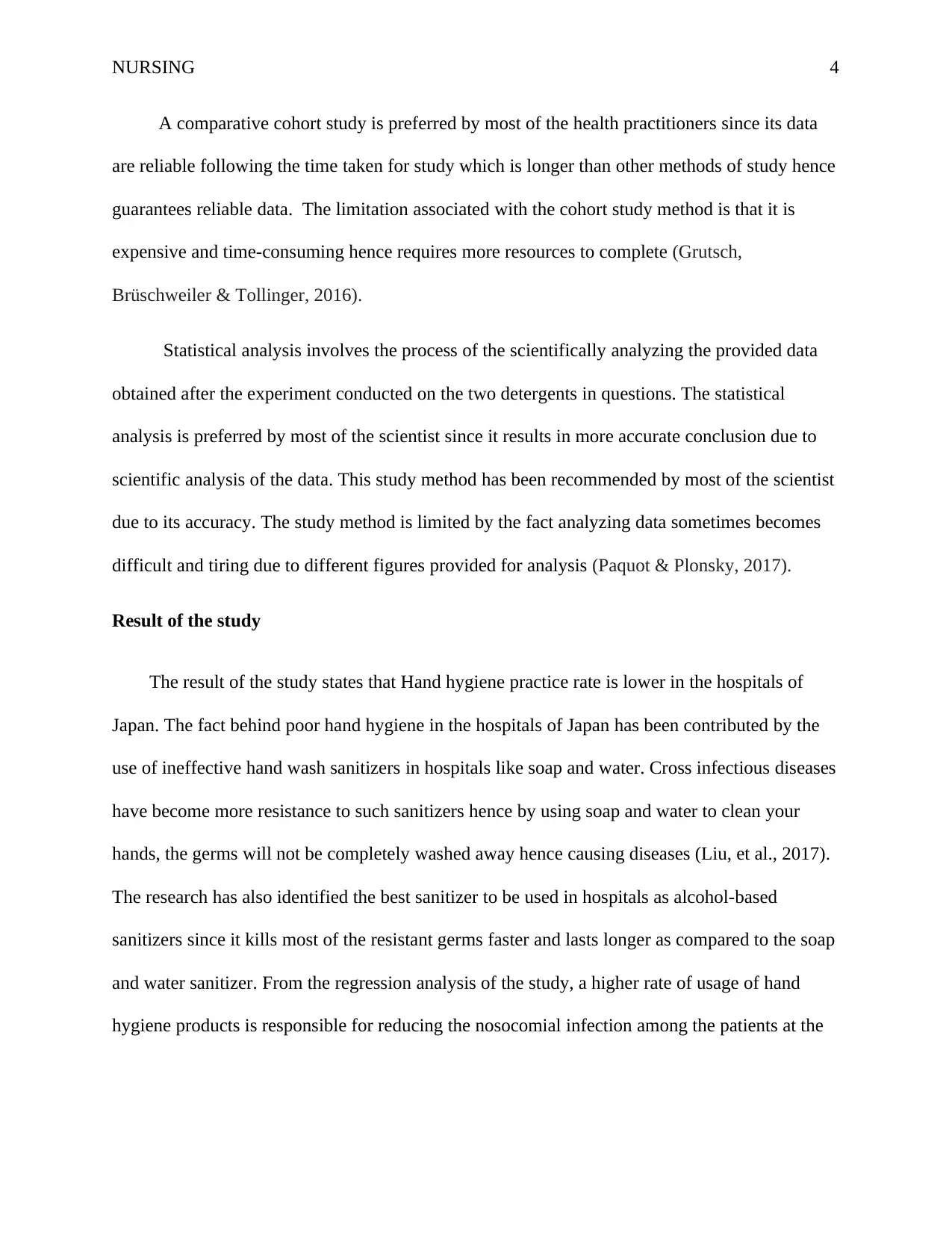
NURSING 4
A comparative cohort study is preferred by most of the health practitioners since its data
are reliable following the time taken for study which is longer than other methods of study hence
guarantees reliable data. The limitation associated with the cohort study method is that it is
expensive and time-consuming hence requires more resources to complete (Grutsch,
Brüschweiler & Tollinger, 2016).
Statistical analysis involves the process of the scientifically analyzing the provided data
obtained after the experiment conducted on the two detergents in questions. The statistical
analysis is preferred by most of the scientist since it results in more accurate conclusion due to
scientific analysis of the data. This study method has been recommended by most of the scientist
due to its accuracy. The study method is limited by the fact analyzing data sometimes becomes
difficult and tiring due to different figures provided for analysis (Paquot & Plonsky, 2017).
Result of the study
The result of the study states that Hand hygiene practice rate is lower in the hospitals of
Japan. The fact behind poor hand hygiene in the hospitals of Japan has been contributed by the
use of ineffective hand wash sanitizers in hospitals like soap and water. Cross infectious diseases
have become more resistance to such sanitizers hence by using soap and water to clean your
hands, the germs will not be completely washed away hence causing diseases (Liu, et al., 2017).
The research has also identified the best sanitizer to be used in hospitals as alcohol-based
sanitizers since it kills most of the resistant germs faster and lasts longer as compared to the soap
and water sanitizer. From the regression analysis of the study, a higher rate of usage of hand
hygiene products is responsible for reducing the nosocomial infection among the patients at the
A comparative cohort study is preferred by most of the health practitioners since its data
are reliable following the time taken for study which is longer than other methods of study hence
guarantees reliable data. The limitation associated with the cohort study method is that it is
expensive and time-consuming hence requires more resources to complete (Grutsch,
Brüschweiler & Tollinger, 2016).
Statistical analysis involves the process of the scientifically analyzing the provided data
obtained after the experiment conducted on the two detergents in questions. The statistical
analysis is preferred by most of the scientist since it results in more accurate conclusion due to
scientific analysis of the data. This study method has been recommended by most of the scientist
due to its accuracy. The study method is limited by the fact analyzing data sometimes becomes
difficult and tiring due to different figures provided for analysis (Paquot & Plonsky, 2017).
Result of the study
The result of the study states that Hand hygiene practice rate is lower in the hospitals of
Japan. The fact behind poor hand hygiene in the hospitals of Japan has been contributed by the
use of ineffective hand wash sanitizers in hospitals like soap and water. Cross infectious diseases
have become more resistance to such sanitizers hence by using soap and water to clean your
hands, the germs will not be completely washed away hence causing diseases (Liu, et al., 2017).
The research has also identified the best sanitizer to be used in hospitals as alcohol-based
sanitizers since it kills most of the resistant germs faster and lasts longer as compared to the soap
and water sanitizer. From the regression analysis of the study, a higher rate of usage of hand
hygiene products is responsible for reducing the nosocomial infection among the patients at the
Paraphrase This Document
Need a fresh take? Get an instant paraphrase of this document with our AI Paraphraser
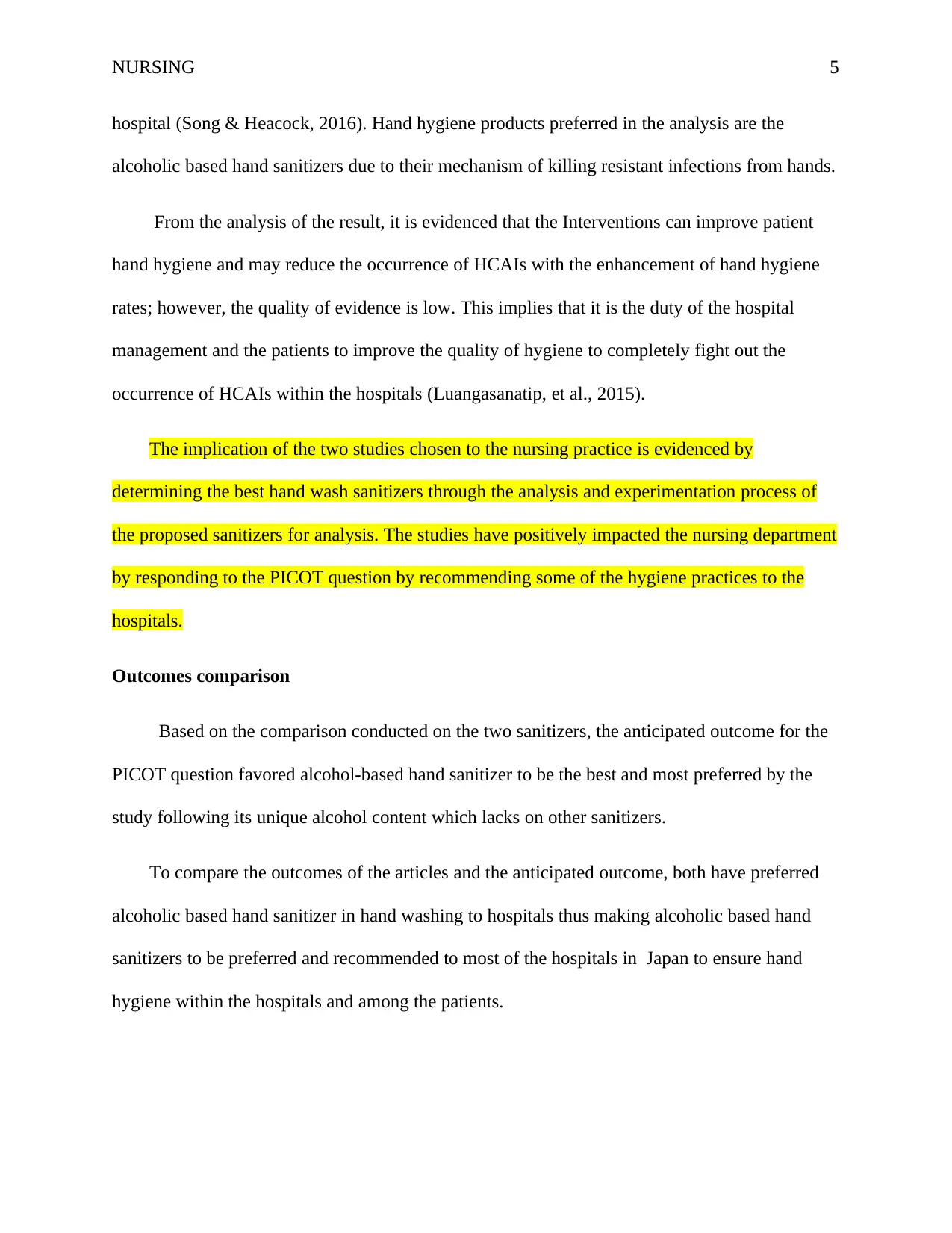
NURSING 5
hospital (Song & Heacock, 2016). Hand hygiene products preferred in the analysis are the
alcoholic based hand sanitizers due to their mechanism of killing resistant infections from hands.
From the analysis of the result, it is evidenced that the Interventions can improve patient
hand hygiene and may reduce the occurrence of HCAIs with the enhancement of hand hygiene
rates; however, the quality of evidence is low. This implies that it is the duty of the hospital
management and the patients to improve the quality of hygiene to completely fight out the
occurrence of HCAIs within the hospitals (Luangasanatip, et al., 2015).
The implication of the two studies chosen to the nursing practice is evidenced by
determining the best hand wash sanitizers through the analysis and experimentation process of
the proposed sanitizers for analysis. The studies have positively impacted the nursing department
by responding to the PICOT question by recommending some of the hygiene practices to the
hospitals.
Outcomes comparison
Based on the comparison conducted on the two sanitizers, the anticipated outcome for the
PICOT question favored alcohol-based hand sanitizer to be the best and most preferred by the
study following its unique alcohol content which lacks on other sanitizers.
To compare the outcomes of the articles and the anticipated outcome, both have preferred
alcoholic based hand sanitizer in hand washing to hospitals thus making alcoholic based hand
sanitizers to be preferred and recommended to most of the hospitals in Japan to ensure hand
hygiene within the hospitals and among the patients.
hospital (Song & Heacock, 2016). Hand hygiene products preferred in the analysis are the
alcoholic based hand sanitizers due to their mechanism of killing resistant infections from hands.
From the analysis of the result, it is evidenced that the Interventions can improve patient
hand hygiene and may reduce the occurrence of HCAIs with the enhancement of hand hygiene
rates; however, the quality of evidence is low. This implies that it is the duty of the hospital
management and the patients to improve the quality of hygiene to completely fight out the
occurrence of HCAIs within the hospitals (Luangasanatip, et al., 2015).
The implication of the two studies chosen to the nursing practice is evidenced by
determining the best hand wash sanitizers through the analysis and experimentation process of
the proposed sanitizers for analysis. The studies have positively impacted the nursing department
by responding to the PICOT question by recommending some of the hygiene practices to the
hospitals.
Outcomes comparison
Based on the comparison conducted on the two sanitizers, the anticipated outcome for the
PICOT question favored alcohol-based hand sanitizer to be the best and most preferred by the
study following its unique alcohol content which lacks on other sanitizers.
To compare the outcomes of the articles and the anticipated outcome, both have preferred
alcoholic based hand sanitizer in hand washing to hospitals thus making alcoholic based hand
sanitizers to be preferred and recommended to most of the hospitals in Japan to ensure hand
hygiene within the hospitals and among the patients.
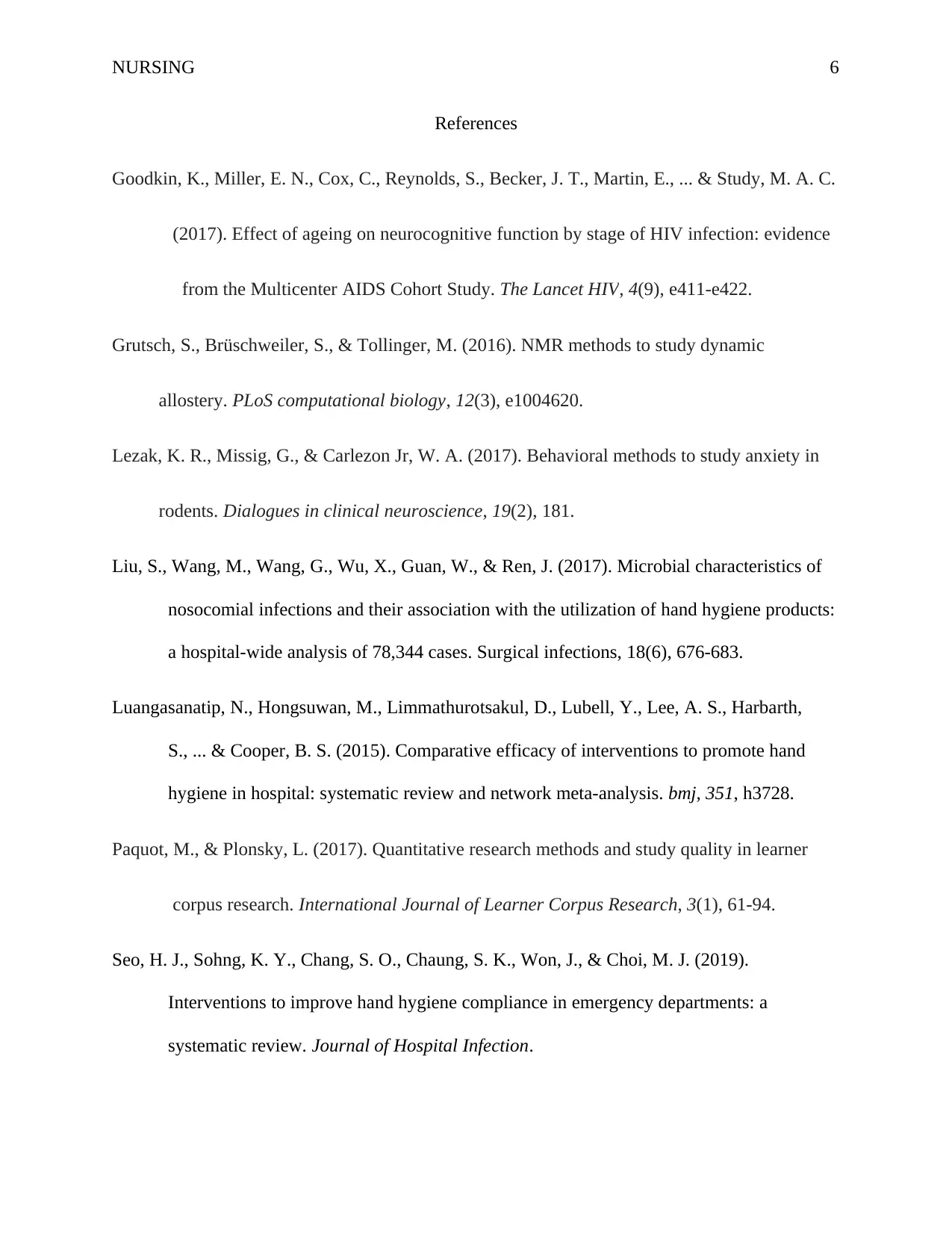
NURSING 6
References
Goodkin, K., Miller, E. N., Cox, C., Reynolds, S., Becker, J. T., Martin, E., ... & Study, M. A. C.
(2017). Effect of ageing on neurocognitive function by stage of HIV infection: evidence
from the Multicenter AIDS Cohort Study. The Lancet HIV, 4(9), e411-e422.
Grutsch, S., Brüschweiler, S., & Tollinger, M. (2016). NMR methods to study dynamic
allostery. PLoS computational biology, 12(3), e1004620.
Lezak, K. R., Missig, G., & Carlezon Jr, W. A. (2017). Behavioral methods to study anxiety in
rodents. Dialogues in clinical neuroscience, 19(2), 181.
Liu, S., Wang, M., Wang, G., Wu, X., Guan, W., & Ren, J. (2017). Microbial characteristics of
nosocomial infections and their association with the utilization of hand hygiene products:
a hospital-wide analysis of 78,344 cases. Surgical infections, 18(6), 676-683.
Luangasanatip, N., Hongsuwan, M., Limmathurotsakul, D., Lubell, Y., Lee, A. S., Harbarth,
S., ... & Cooper, B. S. (2015). Comparative efficacy of interventions to promote hand
hygiene in hospital: systematic review and network meta-analysis. bmj, 351, h3728.
Paquot, M., & Plonsky, L. (2017). Quantitative research methods and study quality in learner
corpus research. International Journal of Learner Corpus Research, 3(1), 61-94.
Seo, H. J., Sohng, K. Y., Chang, S. O., Chaung, S. K., Won, J., & Choi, M. J. (2019).
Interventions to improve hand hygiene compliance in emergency departments: a
systematic review. Journal of Hospital Infection.
References
Goodkin, K., Miller, E. N., Cox, C., Reynolds, S., Becker, J. T., Martin, E., ... & Study, M. A. C.
(2017). Effect of ageing on neurocognitive function by stage of HIV infection: evidence
from the Multicenter AIDS Cohort Study. The Lancet HIV, 4(9), e411-e422.
Grutsch, S., Brüschweiler, S., & Tollinger, M. (2016). NMR methods to study dynamic
allostery. PLoS computational biology, 12(3), e1004620.
Lezak, K. R., Missig, G., & Carlezon Jr, W. A. (2017). Behavioral methods to study anxiety in
rodents. Dialogues in clinical neuroscience, 19(2), 181.
Liu, S., Wang, M., Wang, G., Wu, X., Guan, W., & Ren, J. (2017). Microbial characteristics of
nosocomial infections and their association with the utilization of hand hygiene products:
a hospital-wide analysis of 78,344 cases. Surgical infections, 18(6), 676-683.
Luangasanatip, N., Hongsuwan, M., Limmathurotsakul, D., Lubell, Y., Lee, A. S., Harbarth,
S., ... & Cooper, B. S. (2015). Comparative efficacy of interventions to promote hand
hygiene in hospital: systematic review and network meta-analysis. bmj, 351, h3728.
Paquot, M., & Plonsky, L. (2017). Quantitative research methods and study quality in learner
corpus research. International Journal of Learner Corpus Research, 3(1), 61-94.
Seo, H. J., Sohng, K. Y., Chang, S. O., Chaung, S. K., Won, J., & Choi, M. J. (2019).
Interventions to improve hand hygiene compliance in emergency departments: a
systematic review. Journal of Hospital Infection.
⊘ This is a preview!⊘
Do you want full access?
Subscribe today to unlock all pages.

Trusted by 1+ million students worldwide
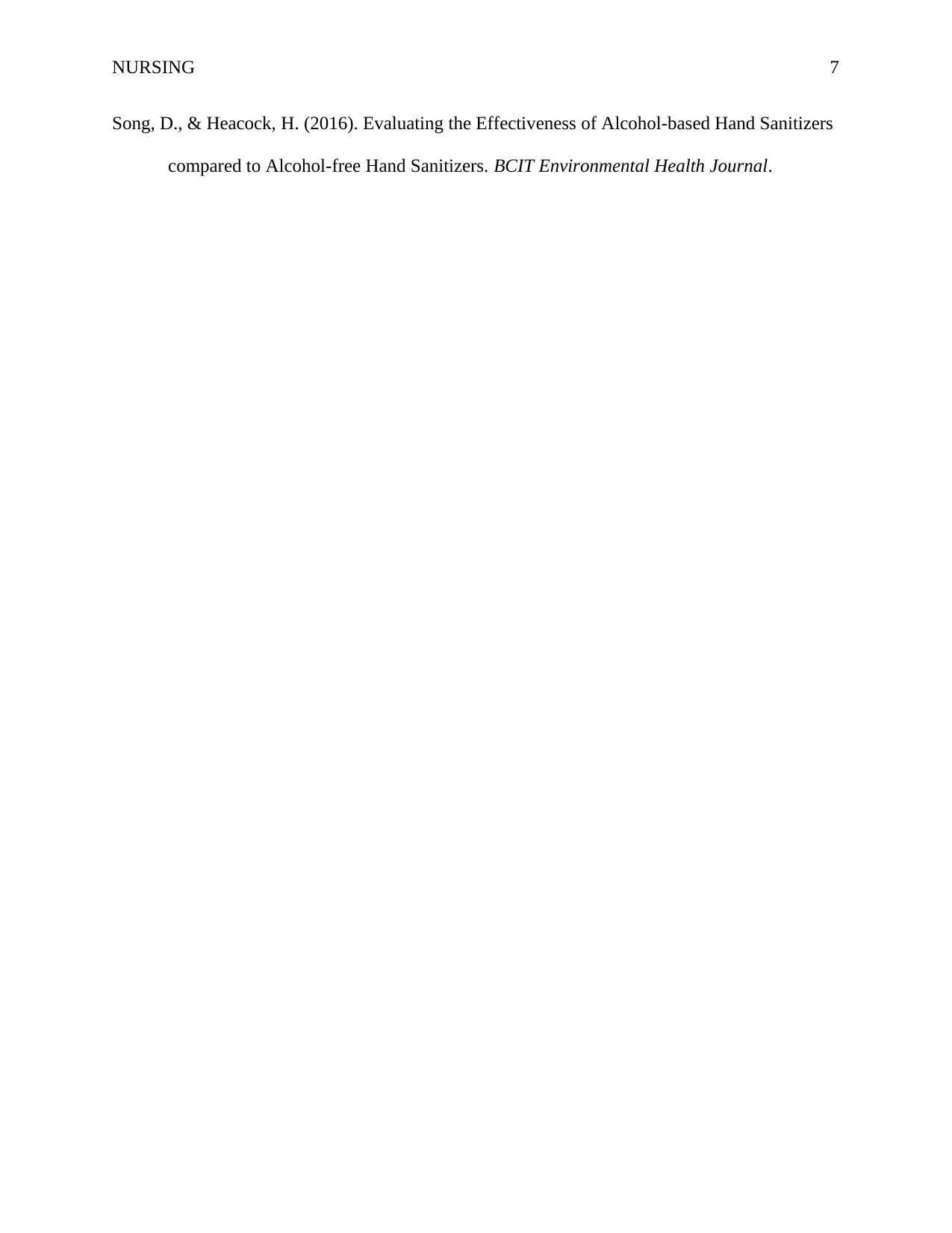
NURSING 7
Song, D., & Heacock, H. (2016). Evaluating the Effectiveness of Alcohol-based Hand Sanitizers
compared to Alcohol-free Hand Sanitizers. BCIT Environmental Health Journal.
Song, D., & Heacock, H. (2016). Evaluating the Effectiveness of Alcohol-based Hand Sanitizers
compared to Alcohol-free Hand Sanitizers. BCIT Environmental Health Journal.
1 out of 7
Related Documents
Your All-in-One AI-Powered Toolkit for Academic Success.
+13062052269
info@desklib.com
Available 24*7 on WhatsApp / Email
![[object Object]](/_next/static/media/star-bottom.7253800d.svg)
Unlock your academic potential
Copyright © 2020–2026 A2Z Services. All Rights Reserved. Developed and managed by ZUCOL.





